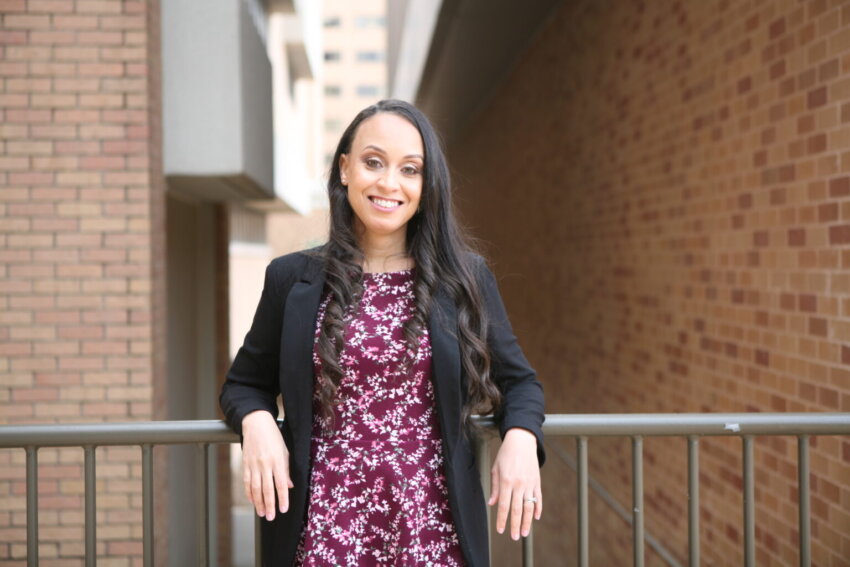Shanae Rhodes, BSN, RN, embodies a dedication to health care equity, which stems from personal experiences that have shaped her concentration in nursing.
“I love taking care of people, meeting people, hearing their story, making them laugh, creating a human connection,” Rhodes said. “There was once a nurse who was there for my family like that.”
The nurse’s impactful presence during Rhodes’ grandmother’s passing cemented her desire to pursue nursing as a career.
“She didn’t say any words. She was just there, present with us. I remember her walking up to me and putting her hands on my forehead. I’m not sure why, but it comforted me as I faced my first great loss,” she said.
After graduating with a Bachelor of Science in Nursing from The University of Texas Health Science Center at San Antonio School of Nursing in 2016, Rhodes began her calling as a medical surgical nurse, drawing daily inspiration from her grandmother’s memory.
Her upbringing in inner-city Detroit motivated Rhodes to delve deeper into the health inequities often faced by those living within lower socioeconomic communities.
“I remember traveling with my grandmother to a suburb of Detroit to visit my uncle,” Rhodes said. “She became suddenly ill, so we took her to the ER and the physician informed us that she should have been on dialysis. We learned there were clear signs of severe kidney issues” left undiagnosed for years, said Rhodes. “Twenty years later, I think back to that and realize I’ve witnessed similar treatment of other people of color, the elderly and those who suffer with mental health or addiction. I began to wonder what I could do about it. I wanted to learn more.”
Her quest to do just that led her back to the health science center to pursue a PhD in nursing science, which has enabled her to contribute to community-based projects focusing on health care access for vulnerable groups.
The COVID-19 pandemic emphasized these access issues, prompting Rhodes to found My Sister’s Keeper (MSK) in 2020, an online community dedicated to promoting health among women of color. Through MSK, Rhodes facilitates open discussions that educate and empower its members.
“Everybody is welcome,” Rhodes said. “We welcome women and men from all backgrounds to our meetings. Since the group was formed, our goal has been to empower women by discussing the health topics that interest them. Guest experts are invited to speak to the group, experts in the field and those with lived experiences. We particularly look for experts who are also women of color because the group is more responsive in discussion with someone they are comfortable with.”
Closing the gap
As interest grew, the MSK group organized, established a board of advisors and began to survey its members regarding their life experiences, specifically with health care. Although her rigorous schedule as a graduate student and travel nurse limits her time with MSK, Rhodes drew research inspiration from the group for her PhD dissertation.
For instance, MSK conversations uncovered a common theme of self-neglect among African American women.
“Many Black women are pouring from an empty pitcher. My grandmother was the same way, raising her kids, then helping to raise my brother and me. This whole time I thought it was just the health care system that didn’t take care of her, but what I now realize is that she also didn’t take care of herself.”
As Rhodes delved deeper into her investigation, she encountered a startling gap: The available research on patients with dementia and their caregivers hardly accounted for African Americans. Upon further analysis, she discovered inconsistencies across multiple studies, particularly in regard to the impact caregiving has on the mental health of African American caregivers.
The revelation reignited Rhodes’ determination to fill these informational gaps and gain a deeper understanding of the experiences of African American women. Her current research focuses on surveying and studying individuals within this group who are also caregivers for those living with dementia.
The purpose of her research study is to shed light on their unique experiences by exploring how the societal expectations embedded in the “strong Black woman” generalization — including perceptions of strength, survival and family preservation — impact the mental health and overall well-being of these African American women caregivers.
A commitment to excellence
Her research is one indication of how Rhodes is broadly committed to health equity and improving health care access. The Nurses’ Educational Funds, Inc. (NEF) recently named Rhodes as the recipient of the 2023 Nurses Educational Funds Doctoral Degree Scholarship. The honor is bestowed to exceptional doctoral nursing students who target the improvement of patient care and become catalysts for positive change in the nursing profession and beyond.
The NEF is a non-profit organization that was established to promote nursing leadership through support for professional nurses seeking advanced degrees in nursing education, practice, research and administration.


